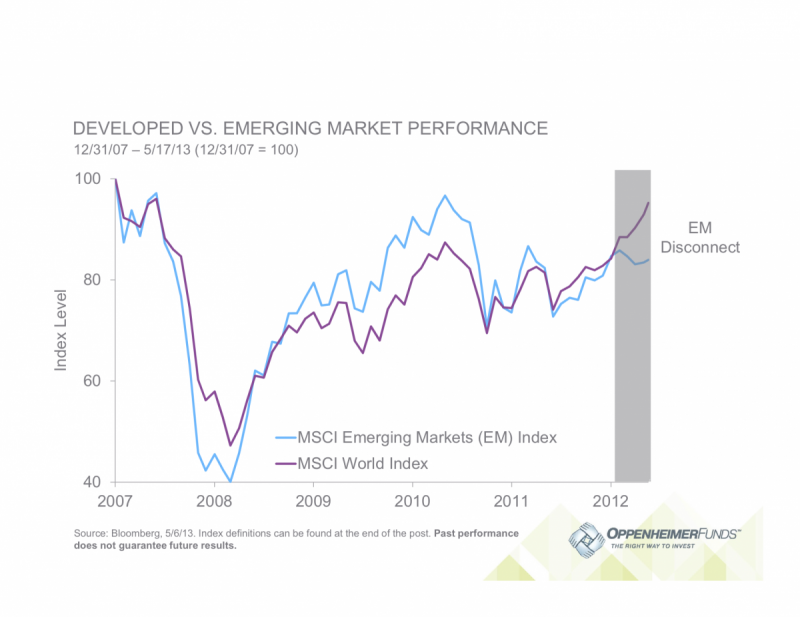Global equities, broadly, are rallying, with year-to-date returns in several markets reaching high single and even double digits. The one glaring exception is the emerging world. Year to date, emerging market indices have underperformed their developed world counterparts. Why?
Although you can’t paint all emerging markets with one brush, there are a few reasons for EM underperformance:
• Monetary policy: Monetary policy across much of the developed world remains historically loose. This is helping to prop up riskier assets such as stocks in those markets. (But, note that we believe that equity fundamentals, particularly in the U.S., are sound, and there is much more to this market than easy money.)
• Slower global growth: Macro conditions are improving in several major economies in the world, but growth remains slower than many would like and concerns over slowing global demand have weighed on EM equities.
• Benchmark composition: The MSCI EM Index is heavily weighted towards commodities — approximately 20% of the companies in the index are commodity-related, versus 11% for the developed market MSCI World Index. Commodity prices have been particularly weak year to date due to a stronger U.S. dollar and weaker global demand. Financials were another notable area of EM underperformance, led by weakness in a few Chinese banks. Country weightings are also important. The United States — one of the strongest performing equity markets year to date — accounts for approximately half of the MSCI World Index. In contrast, China — one of the weakest markets year to date — is one of the largest weights in the MSCI EM Index.
Remember however, that there’s an economic case and an investment case for growth in the emerging world. The economic case is predicated on the view that globalization, and economic and political reforms, will continue to support improving levels of productivity and capital deepening across wide swaths of the emerging world. We believe this, in turn, could drive superior growth rates. 
The investment case seeks to identify companies with sustainable competitive advantages that are well positioned to benefit from these secular tailwinds without regard to those companies’ weights in an index. Price is also an important consideration in the investment case. And sell offs, or relative underperformance like what we’re observing now, often create attractive entry points for long-term investments. We continue to believe that the long-term case for the emerging markets remains intact, and the asset class remains an important part of a 401(k) plan lineup.
Definitions/Disclosures
The MSCI (Morgan Stanley Capital International) Emerging Markets Index is designed to measure global emerging market equity performance.
The MSCI World Index is designed to measure global developed market performance.
Each index is unmanaged and cannot be purchased directly by investors. Index performance is shown for illustrative purposes only and does not predict or depict the performance of any investment. Past performance does not guarantee future results.
Foreign investments may be volatile and involve additional expenses and special risks, including currency fluctuations, foreign taxes and political and economic factors. Investments in emerging and developing markets may be especially volatile.
Diversification does not guarantee profit or protect against loss.
These views represent the opinions of OppenheimerFunds and are not intended as investment advice or to predict or depict performance of any investment. These views are subject to change based on subsequent developments.
Shares of Oppenheimer funds are not deposits or obligations of any bank, are not guaranteed by any bank, are not insured by the FDIC or any other agency, and involve investment risks, including the possible loss of the principal amount invested.
Before investing in any of the Oppenheimer funds, investors should carefully consider a fund’s investment objectives, risks, charges and expenses. Fund prospectuses and summary prospectuses contain this and other information about the funds, and may be obtained by asking your financial advisor, visiting oppenheimerfunds.com or calling 1.800.CALL OPP (225.5677). Read prospectuses and summary prospectuses carefully before investing.
Oppenheimer funds are distributed by OppenheimerFunds Distributor, Inc.
Two World Financial Center, 225 Liberty Street, New York, NY 10281-1008
©2013, OppenheimerFunds Distributor, Inc. All rights reserved.
RPL0000.145.0513 May 22, 2013

